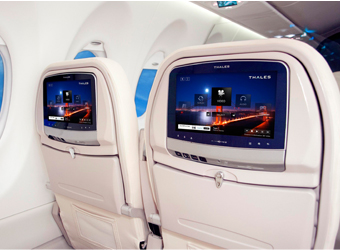Air passengers could be subjected to a series of “shocking” incidents if security flaws in cabin entertainment systems were abused, say researchers.
Security experts found flaws that let them take over cabin entertainment systems.
The flaws could allow attackers to switch off lights, change altitude readings, display bogus maps and broadcast messages via the PA.
Personal information and credit card data were also accessible via the bugs.
Accidental discovery
The weaknesses were found in the Pansonic Aero in-flight systems by Ruben Santamarta, a researcher at security firm IOActive.
The Aero in-flight systems are used by many different airlines including Virgin, Emirates, AirFrance, American Airlines and KLM.
“Security is not one of the system’s main strengths,” Mr Santamarta told the BBC, adding that the network of seat-back screens and on-board servers would not be able to withstand “solid attacks” from skilled adversaries.
Mr Santamarta said he started researching the Panasonic systems two years ago when, during a flight to Dubai, he accidentally made the screen for his seat display debug data.
Via online searches he slowly amassed a trove of information about the Aero system that included code that runs on the seat-back units as well as the on-board computers that keep the whole thing running.
“I ended up having all the components in my computer so I could emulate the whole system,” he said.
Running a copy of the Aero network let Mr Santamarta winkle out flaws and other bugs that, he said, let him “compromise the entire system”.
Travelling on a flight where attackers got access to the Aero system and turned off the cabin lights, broadcast PA messages and changed maps to make it look like a plane was being diverted or was losing altitude would be “shocking”, said Mr Santamarta.
The only good news is that it did not seem to be possible to cross from in-flight systems to those that control an aircraft. However, he said, he did not rule out the possibility that some airlines had inadvertently joined the two systems giving attackers a route into flight controls.
Mr Santamarta said IOActive had told Panasonic about its research and the flaws it had found. It also passed its research to the industry group that circulates information about security risks to airlines.
Panasonic has not responded to an request for comment about the IOActive findings.
Source: BBC


